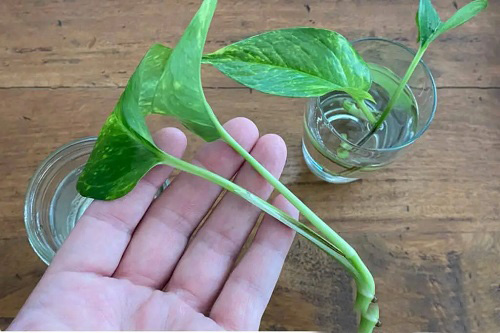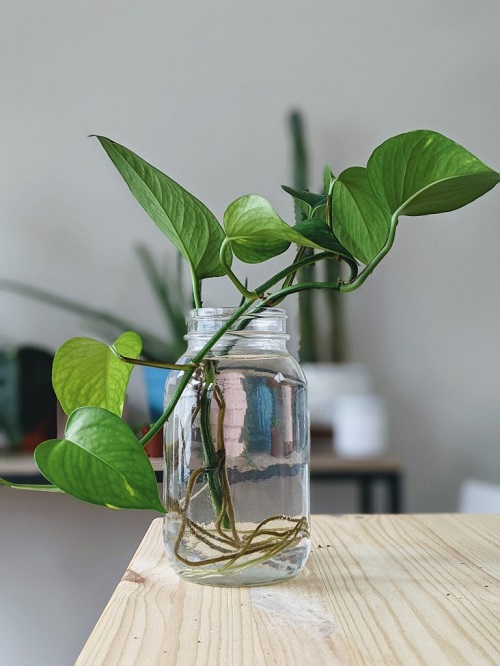If you’re an ultimate lover of indoor plants, learn How to Propagate Pothos to multiply this low-maintenance houseplant in easy steps!
Golden Pothos, also called Devil’s ivy, are the most commonly seen houseplants. They are forgiving, require low maintenance, and don’t have a specific need for light, watering, or fertilization. And not just growing them is easy; propagating them is easier, too. Let’s find out How to Propagate Pothos in detail below!
Check out our article on the best pothos to grow indoors
How to Propagate Pothos

Before starting with pothos propagation, it is important to know a few essential points:
- Pothos can be propagated both in water and soil.
- For propagating in both mediums, you need a healthy 4-6 inches long cutting with 1-2 nodes and a small pot, a glass jar, or any other creative container.
Learn How to Grow Any Pothos Plant
Growing Pothos in Water
The first step starts with getting a glass jar. Fill it up with fresh water and place the cutting in it.
Let the nodes submerge entirely in water, as it is going to aid in the formation of the roots.
Keep the pot in a spot where it can get bright, indirect sunlight. Always keep the plant away from the harsh afternoon sun, as it can harm the tender, budding plant. The roots are going to form within a month.
Once the roots form, keep the plant in the glass jar in water or plant it in soil. However, do remember once pothos roots adapt to grow in the water, it will be difficult for them to change the growing medium. Therefore, it’s better to let them grow the way it is.
Check out some amazing ideas on planting pothos
Growing Pothos in Soil

The process is similar to the one for water. Dip the cut end of cutting in a rooting hormone and plant it in a potting mixture, covering the nodes completely in the soil. Keep the soil moist while ensuring that you are not overwatering the plant, as it can cause root rot.
The roots are going to form in 30-40 days, and it is going to take about two months or more for the plant to start new growth. Keep the soon-to-be-a-new plant away from direct sunlight. With the right care and exposure to sufficient light and warmth, the plant is going to flourish for a long time to come.
Don’t miss checking out these proven pothos plant uses and benefits
Growing Pothos in Soil from Layering
Layering is a process where a low-growing stem of an existing plant is bent into the soil of another pot. This way, the plant forms new roots because the stem is in touch with the moisture of the soil.
For this, select a healthy mother plant and put a small pot filled with soil near it. Next, bend the stem of the mother plant into the new pot, cover one or two nodes of it with soil, and let the remaining top part be exposed to the air. It will form roots really quickly in the growing season. Once the new plant grows bigger, you can cut it from the mother plant.
Similarly, you can grow pothos with air layering too. Select a stem and wrap one or two nodes with a plastic filled with moist sphagnum moss. Do some holes in the plastic to mist the moss every few days. It should remain moist continuously. The node will root in a couple of weeks.
For more information, watch this detailed video
Pothos Propagation Mistakes
1. Taking the Stem from the Wrong Spot
For roots to grow, one of the nodes, along with the stem, has to be in the soil or water. Also, if too much of the stem is left below a node when it is submerged in the water, it might rot.
In the same way, if cuttings have foliage at the top but no nodes at the base, the roots will not emerge. That’s why it’s important to take at least a 4-6 inch long cutting.
2. Lack of Light
Keeping the cutting in a too dark spot can stress the plant. Though pothos plant can thrive in low light, it will do best in bright indirect light; exposure to mild morning sun is also good.
Here are the top tips on getting split leaves on pothos
3. Not Changing the Water
Roots thrive in water due to the presence of oxygen, but after some days, the oxygen in the water gets exhausted, and the roots suffocate. Make sure to change the water every couple of days or when it turns cloudy. Use fresh, non-chlorinated water.
4. Allowing the Cutting to Heal
Keep in mind that callusing a cutting is only required while planting succulents. This prevents succulents from rotting as they contain water.
For pothos, it is unnecessary to make the cuttings callus; just plant them straight into soil or water.
5. Lack of Warmth
Pothos appreciate the warmth, and if you keep the cuttings in the cold, then it will obstruct root growth. The ideal temperature will be above 60 F (15 C) in the presence of bright sunlight.
6. Changing the Growing Medium Too Late
The roots of water-grown cuttings are slightly different from the soil; they are more delicate and adjust to get everything from water alone. The more time you keep the roots in water, the tougher it will be for them to live in the soil.
If you want to change the growing medium from water to soil, it’s better to move your cuttings to the soil when the roots grow about an inch. Otherwise pothos can live quite long in water and even thrive nicely, so you can keep them in water forever.
Learn All About Growing Manjula Pothos
7. Be Patient!
Don’t lose patience if cuttings are still looking green but not rooted. They will take a couple of weeks or more, depending on the growing conditions.
8. Taking a Too-Long Cutting
If you take a 12-14 inches long cutting for propagation, chances are high that it will wilt, and some leaves will turn yellow. Remember that a big portion of the vine needs more moisture to survive.
For a successful outcome, take cuttings not longer than 4-6 inches with a node. It’s also important to remove all the lower leaves apart from the top ones.
9. Taking Cuttings from a Damaged or Old Vine
For successful results, take cuttings from a healthy pothos plant. If the stems are too old or damaged, the plant may struggle to form roots.
Root formation needs a lot of energy; select a stem with vigorous growth on the mother plant.







While in the rooting process, should you mist the leaves?